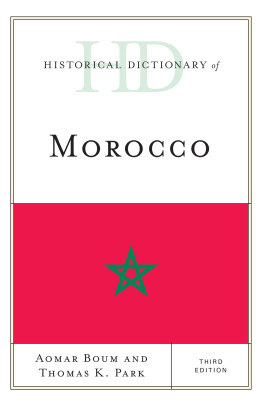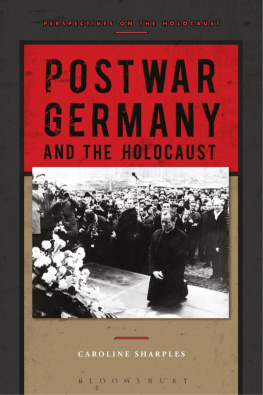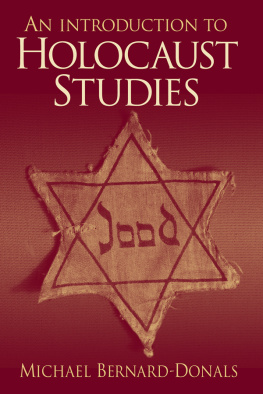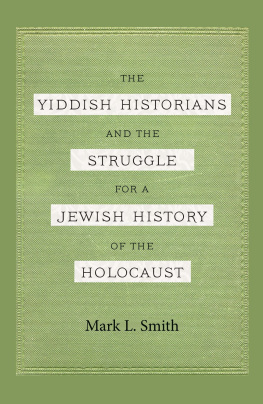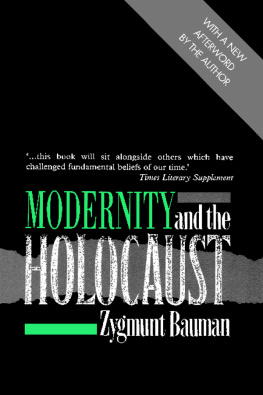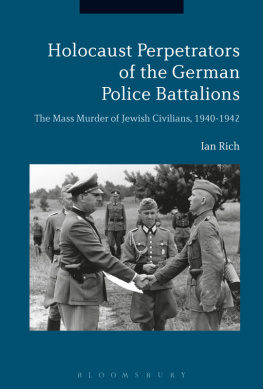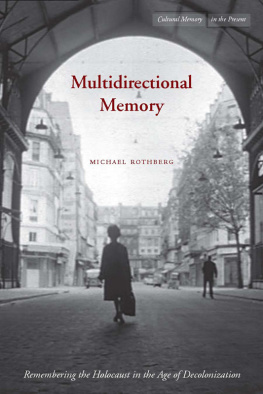The Holocaust and North Africa
Edited by Aomar Boum and Sarah Abrevaya Stein
Stanford University Press
Stanford, California
Stanford University Press
Stanford, California
Published in association with the United States Holocaust Memorial Museum.
2019 by the Board of Trustees of the Leland Stanford Junior University. All rights reserved.
No part of this book may be reproduced or transmitted in any form or by any means, electronic or mechanical, including photocopying and recording, or in any information storage or retrieval system without the prior written permission of Stanford University Press.
The opinions expressed in this volume are those of the authors and are not necessarily those of the United States Holocaust Memorial Museum.
Printed in the United States of America on acid-free, archival-quality paper
Library of Congress Cataloging-in-Publication Data
Boum, Aomar, editor. | Stein, Sarah Abrevaya, editor.
The Holocaust and North Africa / edited by Aomar Boum and Sarah Abrevaya Stein.
Stanford, California : Stanford University Press, 2018. | Includes bibliographical references and index.
Identifiers: LCCN 2018004661 (print) | LCCN 2018021135 (ebook) | ISBN 9781503607064 (e-book) | ISBN 9781503605435(cloth) | ISBN 9781503607057(paperback)
Subjects: LCSH: Holocaust, Jewish (19391945)Africa, North. | JewsPersecutionsAfrica, NorthHistory. | AntisemitismAfrica, NorthHistory. | World War, 19391945Africa, North. | Collective memoryAfrica, North.
Classification: LCC DS135.A25 (ebook) | LCC DS135.A25 H65 2018 (print) | DDC 940.53/180961dc23
LC record available at https://lccn.loc.gov/2018004661
Cover designer: Rob Ehle
Cover photograph: Sidi Mahrez Mosque, Tunis, early 1943. Bundesarchiv.
Typeset by Bruce Lundquist in 11/13.5 Adobe Garamond Pro
Contents
Aomar Boum and Sarah Abrevaya Stein
Daniel J. Schroeter
Jens Hoppe
Ruth Ginio
Susan Slyomovics
Aomar Boum and Mohammed Hatimi
Daniel Lee
Aomar Boum
Lia Brozgal
Alma Rachel Heckman
Omer Bartov
Susan Rubin Suleiman
Susan Gilson Miller
Haim Saadoun
Michael Rothberg
Todd Presner
Introduction
Aomar Boum and Sarah Abrevaya Stein
WHAT WOULD I HAVE DONE if I had been a German Jew on his way, with all his family, to the gas chambers, or, worse, condemned to become a slave member of these unimaginable Sonderkommandos, expected to throw his own co-religionists in the flames of ovens, before being thrown there in his turn? This question motivated Algerian writer Anouar Benmalek to craft Fils de Shol (Son of Shol), a new work of fiction that reflects the burgeoning interest in the Holocaust among francophone Algerian novelists. So it is that Benmalek, a Moroccan-born Algerian Muslim author, co-founder of the Algerian Committee Against Torture, has written a work that fictively integrates the history of the Holocaust, North Africa, colonial acts of genocide in Africa, Muslims, Jews, and their complexly intertwinedand sometimes conflictualforms of collective memory.
It is striking that Fils de Shol, a gripping and haunting novel, triangulates North African history with the Holocaust by way of Namibia and a German teenager. The historical connections between the Holo Yet a shorter, more direct vector links the Maghreb and the Holocaust more than even these writers recognized. The Holocaust, after all, has a North African dimension of its own, albeit one that has been hitherto unexplored. It is the aim of this pioneering volume to flesh out our understanding of the ways the Holocaust unfolded in North Africa, a region considered marginal, if not to World War II (which was fought in part on North African soil), then to the racial and genocidal policies of the Nazis and their allies.
In this introduction we begin by offering a short historical survey of the Holocausts manifestations in German-, French-, and Italian-occupied North Africa. In addition, though with considerably more brevity, we describe the circumstances that faced Jews from North Africa who found themselves in Europe over the course of World War II. A second, somewhat more meditative section returns us to the probing questions raised by Benmaleks Fils de Shol: Why has North Africa been written out of Holocaust history and memory, and, conversely, why has the Holocaust been excised from so many narratives about North Africa? Finally, a last section introduces the reader to the essays that follow. Here, we suggestas do the essayists themselvesthat alongside a penetrating silence about the Holocaust and North Africa there exists a rich body of texts, voices, and archives that await our attention.
Jews, Muslims, and the Holocaust in North Africa: A Historical Overview
On the eve of World War II, the Maghreb was home to one of the largest and socially vibrant Jewish populations in the Islamic world. Most of these Jews were indigenous to the region, with a history that dated to the pre-Islamic period. Others immigrated to North Africa during the Spanish Inquisition or after their exile from Iberia, settling in northern urban centers such as Ttouan and Oran. By the modern period, Jews constituted an overall minority in North Africa, with Muslims (Arab and Amazigh, or Berber) the dominant population. Still, in certain cities and towns, Jews made up a significant percentage (and/or highly visible portion) of the whole, with many playing influential roles as artisans and merchants.
The total population of North African Jewry hovered at half a million before the outbreak of the second global conflict of the twentieth century. In 1941 a census by the French wartime government based in Vichy put the number of Algerian Jews at nearly 110,000 and counted an additional small population of foreign Jews. Neighboring Tunisia claimed 80,000 Jews and Morocco 240,000. Forty thousand Jews lived in Libya during its protracted Italian colonization, concentrated primarily in Tripoli and Benghazi. All told, Jews in interwar North Africa lived under different legal regimes, spoke a variety of languages, hewed to different minhagim (religious rituals), and could claim diverse ancestries. They were less a single, discrete population than an internally diverse one.
Most of the Jews in interwar Algeria were citizens of France, according to the 1870 Crmieux Decree. At the same time, North African Jews exposure to French, Spanish, and Italian culture (especially to the Alliance Isralite Universelle, the Franco-Jewish philanthropy and educational organization) since at least the nineteenth century prompted waves of modernization and embourgoisement, leading Jews to become vehicles of social and cultural change not only for their communities but for the Maghreb as a whole.
These populations experienced different legal and political regimes before the war and thus experienced World War II in different ways as colonial rule was complexly overlaid with fascism. As in Europe, in North Africa the Holocaust was not a single affair, nor did it hew to a single chronology.
When Germany occupied France in May 1940, the terms of the armistice divided the country in two. Germany assumed control over northern occupied France; the southern third of France and its North African colonies (their colonial bureaucracy still largely intact) was led from the city of Vichy, under the oversight of Marshal Henri Philippe Ptain. Vichy policy would differ across Morocco, Algeria, and Tunisia, much as Nazi policy differed across Ukraine, Belarus, and the Baltic states. Daniel Schroeters and Ruth Ginios contributions to this volume (], which looks at the nuances of Italian fascist law in colonial Libya). We therefore summarize this history only tersely here.
Next page

